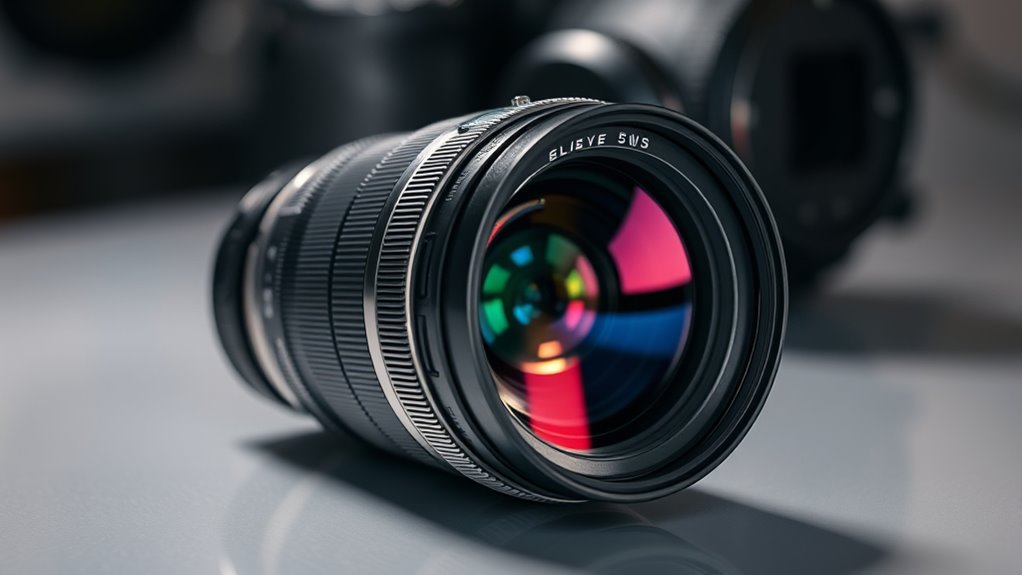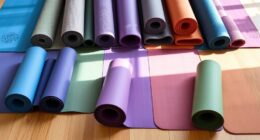If you’re looking for the 15 best premium professional DSLR lenses that deliver stunning image quality, I’ve got you covered. These include versatile zooms, prime lenses for low-light and portrait work, specialty vintage options, and super telephoto lenses. Each lens is designed to elevate your photography with exceptional clarity, sharpness, and control. If you keep going, you’ll discover the top choices for every shooting style and how to select the perfect one for your needs.
Key Takeaways
- The list includes a variety of prime, zoom, and specialty lenses designed for professional DSLR photography.
- These lenses offer superior image sharpness, excellent low-light performance, and beautiful bokeh effects.
- Premium options feature advanced optical designs, durable build quality, and weather-sealed construction.
- The selection caters to diverse photography needs, including portraits, landscapes, wildlife, and street photography.
- Each lens is optimized for delivering stunning, high-quality images suitable for professional and enthusiast use.
Original Retropia Repurposed Disposable Camera Lens

If you’re looking to add a vintage touch to your photography without the hassle of editing, the Original Retropia Repurposed Disposable Camera Lens is an excellent choice. Designed specifically for Canon EF-M mount mirrorless cameras, it delivers a film-like aesthetic with ease. This tiny lens creates dreamy, soft blur effects that evoke nostalgic, retro vibes—no editing needed. Its compact, lightweight design makes it perfect for spontaneous shots on the go. Plus, made from repurposed lenses, it’s an eco-friendly option that reduces waste. It’s ideal for creators seeking unique, vintage-inspired visuals that effortlessly elevate their storytelling.
Best For: creators and photographers seeking easy-to-achieve vintage, retro-inspired images with minimal effort and editing.
Pros:
- Produces authentic film-like aesthetics and dreamy soft blur effects without post-processing
- Compact, lightweight design makes it perfect for spontaneous, on-the-go photography
- Eco-friendly, made from repurposed lenses that reduce waste and support sustainable practices
Cons:
- Exclusively compatible with Canon EF-M mount mirrorless cameras, limiting device versatility
- May introduce small imperfections that could be undesirable for some professional applications
- Limited control over visual effects compared to digital editing or specialized filters
Canon RF-S 18-150mm f/3.5-6.3 STM Lens with Filter Kit, Cleaning Kit & Cap Keeper
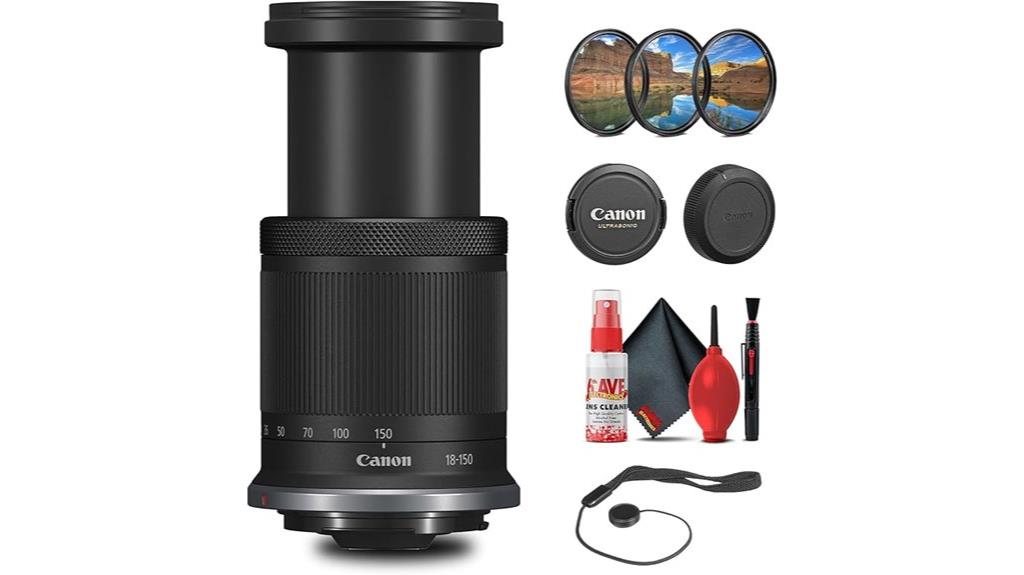
The Canon RF-S 18-150mm f/3.5-6.3 STM Lens with Filter Kit, Cleaning Kit, and Cap Keeper is an excellent choice for photographers who want versatility and convenience in a compact package. Designed for Canon APS-C mirrorless cameras like the EOS R10 and R50, it covers a broad focal range from 29-240mm, perfect for landscapes, portraits, and everyday shots. Its optical technology reduces aberrations, while Super Spectra Coating minimizes flare. The included accessories—filter kit, cleaning tools, and cap keeper—ensure easy maintenance. Weighing just 1.37 pounds and measuring around 5 inches, it’s ideal for on-the-go shooting without sacrificing image quality.
Best For: amateur and hobbyist photographers seeking a versatile, lightweight zoom lens for everyday photography and travel on Canon APS-C mirrorless cameras.
Pros:
- Covers a broad focal range of 29-240mm, suitable for various photography styles
- Includes accessories like filter kit, cleaning tools, and cap keeper for easy maintenance and protection
- Compact and lightweight design at 1.37 pounds, ideal for on-the-go shooting
Cons:
- Zooming can feel stiff and may require extra effort to operate smoothly
- Aperture range of f/3.5-6.3 limits low-light performance compared to faster lenses
- Being a renewed product, it may have minor cosmetic imperfections despite excellent optical condition
Canon EF 50mm f/1.8 STM Lens

The Canon EF 50mm f/1.8 STM Lens stands out as a top choice for photographers seeking an affordable yet versatile prime lens that excels in low-light conditions. Its bright f/1.8 aperture captures more light, ensuring sharp images with beautiful background blur. Compact and lightweight, it’s perfect for everyday use, portraits, street, and nighttime photography. The STM motor offers near-silent autofocus, ideal for video. With a solid metal mount and a minimum focusing distance of just over a foot, it delivers reliable performance and great image quality at a budget-friendly price, making it a must-have for both beginners and seasoned shooters.
Best For: amateur and enthusiast photographers seeking an affordable, versatile prime lens for portraits, street photography, and low-light conditions.
Pros:
- Bright f/1.8 aperture for excellent low-light performance and beautiful background blur
- Compact, lightweight design ideal for everyday carry and extended shooting sessions
- Near-silent STM autofocus perfect for capturing videos with minimal noise
Cons:
- Fixed 50mm focal length may limit versatility for wide-angle or telephoto needs
- Manual focus can be less precise in low-light or fast-moving scenarios due to focus ring placement
- Build quality, while solid, is less robust compared to more expensive professional lenses
Nikon 24-70mm f/2.8E ED Vibration Reduction Zoom Lens for Nikon DSLR
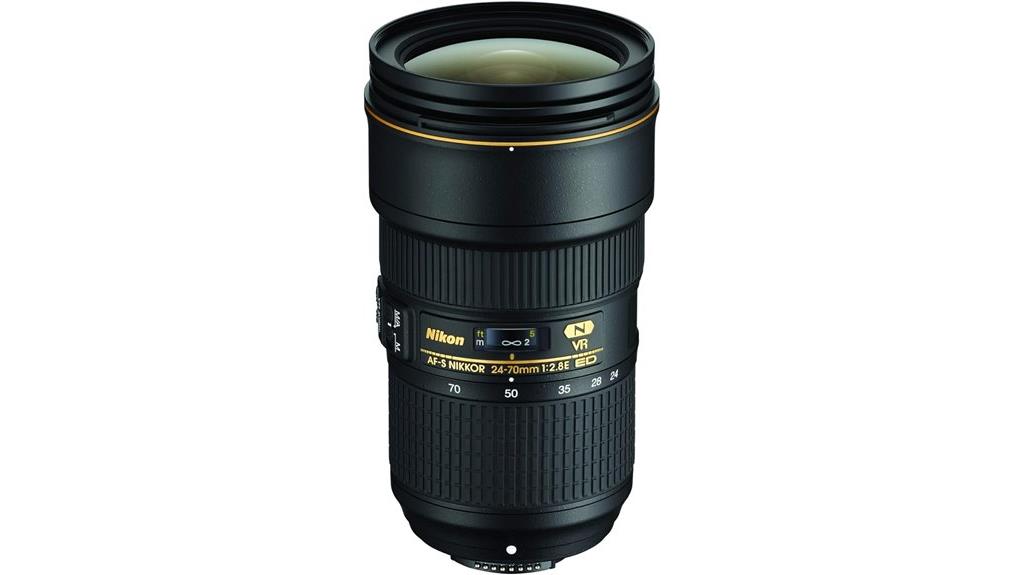
Photographers seeking exceptional image quality and versatility will find the Nikon 24-70mm f/2.8E ED VR an outstanding choice, especially when working with full-frame DSLR cameras. This lens offers a constant f/2.8 aperture, ensuring excellent low-light performance and beautiful bokeh. Its advanced optical design minimizes chromatic aberrations and distortions, delivering sharp, clear images from center to edges. The built-in Vibration Reduction provides approximately 4 stops of stabilization, making handheld shooting in low light or at slow shutter speeds reliable. Durable and weather-sealed, it’s perfect for professional use across a variety of shooting environments.
Best For: Professional photographers and enthusiasts seeking high-quality, versatile zoom lens performance for full-frame DSLR cameras in various lighting and environmental conditions.
Pros:
- Constant f/2.8 aperture delivers excellent low-light capability and beautiful bokeh.
- Advanced optical design with ASP/ED elements ensures sharp, clear images across the frame.
- 4 stops of Vibration Reduction stabilizes handheld shots effectively, even in challenging conditions.
Cons:
- Relatively large and heavy, which may affect portability and handling.
- Premium price point may be a barrier for casual photographers.
- Slightly limited focusing distance at shorter focal lengths (minimum focus around 1.2 feet).
Nikon AF-S DX NIKKOR 55-300mm f/4.5-5.6G ED Vibration Reduction Zoom Lens
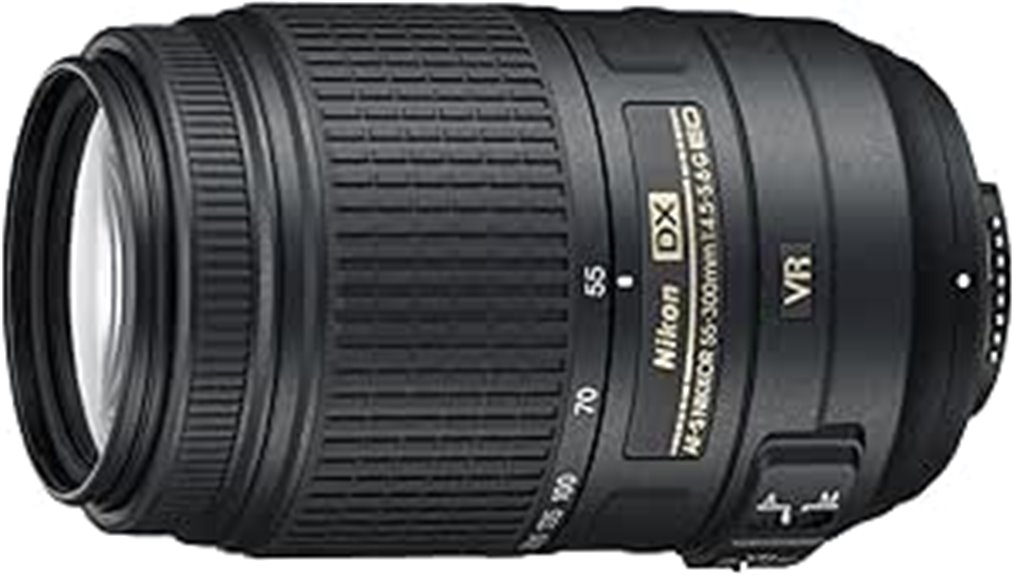
If you’re looking for an affordable yet versatile telephoto zoom lens, the Nikon AF-S DX NIKKOR 55-300mm f/4.5-5.6G ED VR is an excellent choice for amateur photographers and hobbyists aiming to capture distant subjects with sharpness and stability. With a 55-300mm focal range and built-in Vibration Reduction, it delivers crisp images even at full zoom, making it ideal for wildlife, sports, and outdoor photography. Its optical design includes ED elements for minimal aberrations, while the Silent Wave Motor ensures quiet autofocus. Although not suited for low-light conditions due to its aperture, it’s highly valued for its sharpness, durability, and excellent value.
Best For: amateur photographers and hobbyists seeking an affordable, versatile telephoto zoom lens for outdoor, wildlife, and sports photography.
Pros:
- Excellent image sharpness and clarity across zoom ranges
- Effective Vibration Reduction for stable handheld shots at full zoom
- Compact build with ED elements for minimal aberrations and high-quality results
Cons:
- Limited low-light performance due to its f/4.5-5.6 aperture
- Slight hunting in autofocus in low contrast or challenging lighting conditions
- Heavier and larger than shorter zoom options, making all-day travel less comfortable
Nikon AF-S FX NIKKOR 50mm f/1.8G Lens for Nikon DSLR Cameras
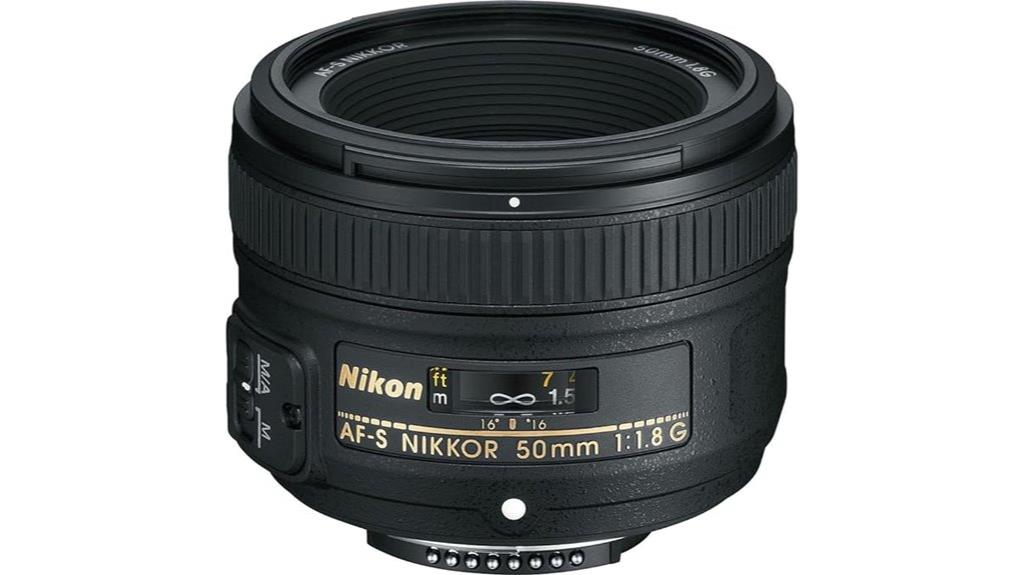
Looking for a versatile prime lens that offers exceptional sharpness and low-light performance without breaking the bank? The Nikon AF-S FX NIKKOR 50mm f/1.8G is a compact, lightweight lens designed for Nikon DSLR cameras. It features a fast f/1.8 aperture, delivering bright images and beautiful background blur, perfect for portraits, street, and landscape photography. Its optical system includes an aspherical element, ensuring edge-to-edge sharpness across FX and DX formats. With quick, quiet autofocus and solid build quality, this lens provides reliable, true-to-life images. It’s an affordable, user-friendly choice for enthusiasts and professionals alike seeking high-quality results in a compact package.
Best For: photographers seeking an affordable, compact, and versatile prime lens for portrait, street, and landscape photography with excellent low-light capabilities.
Pros:
- Sharp, detailed images with edge-to-edge clarity across FX and DX formats
- Fast, quiet autofocus ideal for capturing spontaneous moments
- Lightweight and durable design, making it easy to carry and handle
Cons:
- Slightly soft images wide open at f/1.8, requiring stopping down for optimal sharpness
- Built with plastic materials, which may feel less premium but remains durable
- No zoom capability, limiting framing flexibility compared to zoom lenses
Meike 85mm F1.8 Portrait Lens for Nikon Z Mount Cameras

The Meike 85mm F1.8 Portrait Lens stands out as an excellent choice for Nikon Z mount users seeking professional-grade portrait photography and high-quality video. Its compatibility with a wide range of Z cameras, including Z9 and Z6II, ensures versatile use, while features like autofocus, Eye AF, and electronic aperture support make shooting effortless. The lightweight design, adjustable aperture ring, and Type-C firmware upgrade interface enhance usability. With a classic 85mm focal length, wide F1.8 aperture, and nine-blade bokeh, it captures stunning images with smooth backgrounds. Advanced optical elements minimize aberrations, delivering high resolution and vibrant color, perfect for both stills and video.
Best For: professional portrait photographers and videographers using Nikon Z mount cameras who desire high-resolution, sharp images with smooth bokeh and quiet autofocus.
Pros:
- Compatible with a wide range of Nikon Z cameras, including Z9 and Z6II, ensuring versatile usage.
- Features fast F1.8 aperture and 9-blade bokeh for stunning background blur.
- Lightweight design with electronic aperture control and firmware upgrade options for easy handling and updates.
Cons:
- Fixed focal length may limit creative flexibility compared to zoom lenses.
- Premium optical elements might increase the price compared to standard lenses.
- Limited macro capabilities with a maximum magnification of 0.11X.
Meike 85mm F1.8 Portrait Lens for Canon EF Cameras
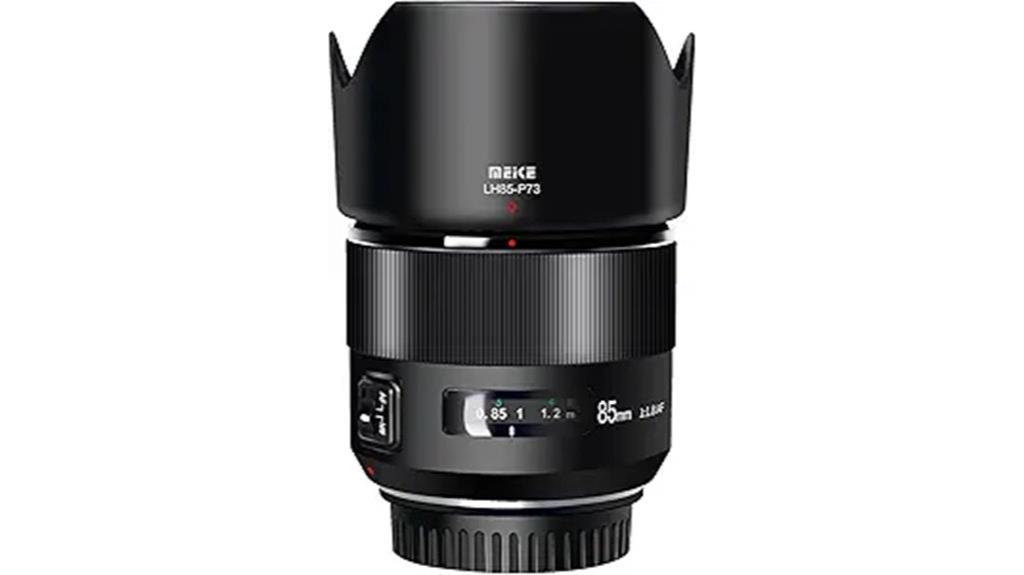
Photographers seeking a versatile portrait lens that combines sharpness, beautiful bokeh, and affordability will find the Meike 85mm F1.8 perfectly suited for their needs. Designed for Canon EF cameras, it offers a bright F1.8 aperture, delivering stunning background blur and excellent subject separation. Its solid metal mount and professional look give it a premium feel, while the compact 15-ounce build makes it easy to handle. The lens features quick autofocus, though it can be a bit noisy, and manual focus is smooth with a 90-degree rotation. Overall, it provides impressive image quality, making it a great choice for portrait and landscape photography on a budget.
Best For: photographers on a budget seeking a versatile, sharp portrait lens with beautiful bokeh for Canon EF DSLR cameras.
Pros:
- Excellent image sharpness and pleasing background blur at F1.8
- Solid metal build with a professional appearance and compact design
- Quick autofocus with smooth manual focus rotation
Cons:
- Autofocus can be noisy and occasionally struggle in low light
- Lack of image stabilization may affect video shooting stability
- Some users report focusing inconsistencies and chromatic aberration
Canon EF 75-300mm f/4-5.6 III Telephoto Zoom Lens for Canon SLR Cameras
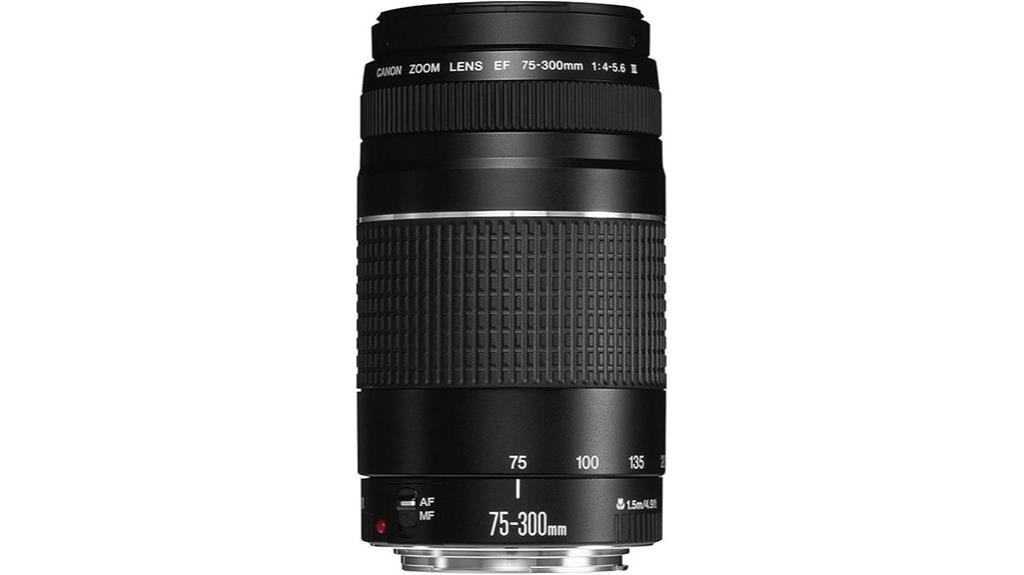
If you’re seeking an affordable yet reliable telephoto zoom lens for your Canon SLR camera, the Canon EF 75-300mm f/4-5.6 III is a solid choice. It offers a versatile 75-300mm zoom range with a maximum aperture of f/4-5.6, ideal for capturing distant subjects. The lens features an improved mechanism for smoother zooming and a front zoom ring with a silver ring for easy handling. With a closest focusing distance of 4.9 feet, it allows for closer shots. Weighing just 16.8 ounces and measuring 4.8 inches long, it’s lightweight and portable, though it lacks image stabilization. It comes with a one-year warranty, making it a budget-friendly option.
Best For: Amateur photographers and hobbyists seeking an affordable telephoto zoom lens for capturing distant subjects with their Canon SLR camera.
Pros:
- Versatile 75-300mm zoom range suitable for various shooting scenarios
- Improved mechanism allows for smoother zooming operation
- Lightweight and portable design weighing only 16.8 ounces
Cons:
- Lacks image stabilization, which may affect handheld shot quality
- Maximum aperture of f/4-5.6 limits low-light performance
- Slightly compact size may limit handling and grip for some users
Nikon NIKKOR Z 85mm f/1.8 S Portrait Prime Lens for Z Cameras
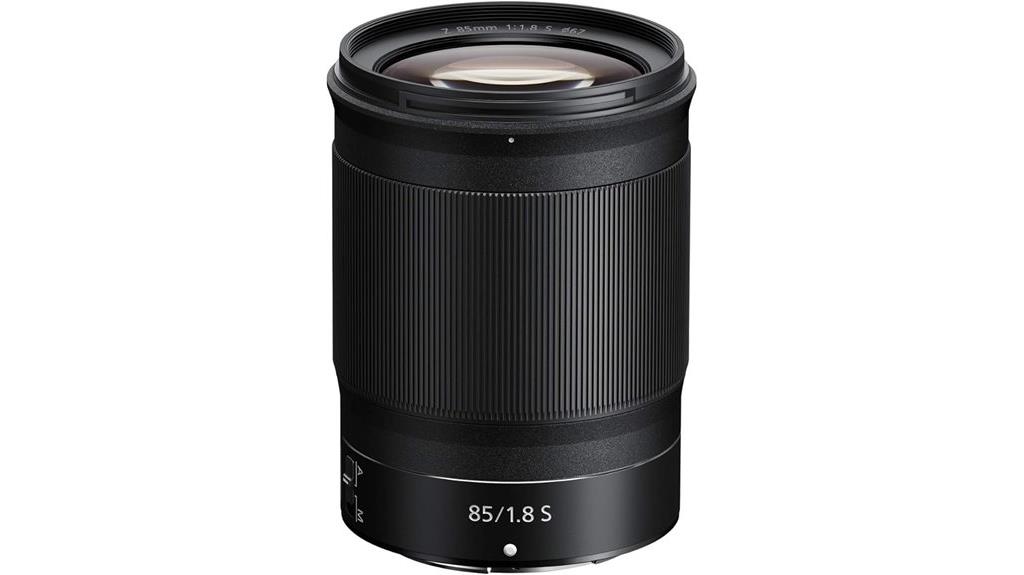
For professionals seeking exceptional portrait quality, the Nikon NIKKOR Z 85mm f/1.8 S stands out as a top choice thanks to its large f/1.8 aperture and stunning bokeh. Its compact, lightweight design (just over a pound) makes it easy to handle, while extensive sealing guarantees durability in various conditions. The lens delivers sharp images, smooth progression from focus to background, and excellent low-light performance. Autofocus is quick and reliable, perfect for capturing fleeting moments. With features like Nano Crystal coating and nine-blade diaphragm, it produces beautiful, professional results ideal for portraits, fashion, and even street photography.
Best For: professional photographers and enthusiasts seeking high-quality portraits, fashion shots, and versatile low-light performance with a lightweight, durable lens.
Pros:
- Excellent optical quality with sharp images and beautiful bokeh
- Fast, accurate autofocus suitable for capturing fleeting moments
- Durable build with extensive sealing for reliable performance in various conditions
Cons:
- Higher price point compared to standard f/1.8 lenses
- Slightly tight fit for indoor or cramped spaces
- Limited to Nikon Z series mirrorless cameras, reducing compatibility with other systems
EF 85mm f1.8 Portrait Lens for Canon DSLR Cameras
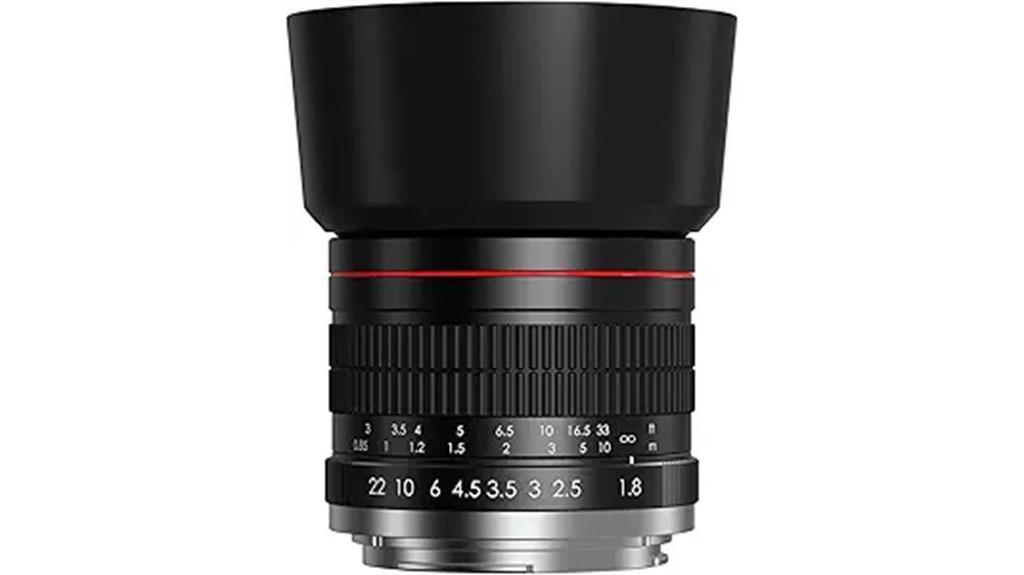
The EF 85mm f1.8 Portrait Lens stands out as an excellent choice for photographers who prefer precise manual focus and artistic control. Designed for Canon DSLR cameras, it offers superb image quality with sharpness, beautiful bokeh, and minimal aberrations thanks to hybrid aspherical elements and ultra multi-coating. Its fully manual operation, with a large focus ring and internal focus mechanism, encourages creative expression. While some users note tight focus rings or minor mechanical quirks, many praise its lightweight build, affordability, and exceptional portrait results. Ideal for artistic photographers, this lens demands careful handling but rewards users with stunning, customizable images.
Best For: photographers seeking precise manual focus, artistic control, and high-quality portrait images on Canon DSLR cameras.
Pros:
- Excellent image sharpness and beautiful bokeh for portraits
- Fully manual operation encourages creative expression and skill development
- Lightweight and durable metal build, making it comfortable for extended use
Cons:
- Some users experience tight focus rings and minor mechanical quirks
- No autofocus capability, which may be limiting for fast-paced shooting
- Mechanical issues like loose screws or fit may require adjustment or repair
Tamron 50-400mm f/4.5-6.3 Di III VC VXD Lens (Nikon Z) Kit
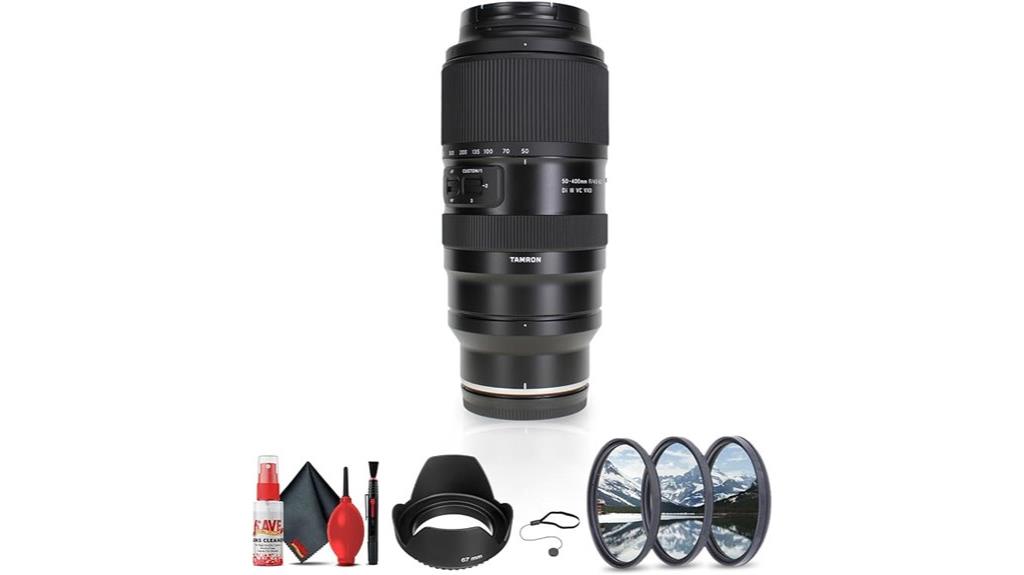
Photographers seeking a versatile zoom lens that covers everything from wide-angle landscapes to distant wildlife will find the Tamron 50-400mm f/4.5-6.3 Di III VC VXD Kit an excellent choice, especially if they shoot with Nikon Z full-frame cameras. This lens offers an extensive focal range, reducing the need to switch lenses and making it perfect for various scenarios. Its compact design, combined with fast, quiet autofocus via VXD drive, ensures sharp images even in dynamic environments. With built-in image stabilization, weather-resistant construction, and macro capabilities, it balances performance and convenience, making it a reliable workhorse for both amateurs and professionals.
Best For: photographers using Nikon Z full-frame cameras who need a versatile, all-in-one zoom lens for landscapes, wildlife, portraits, and macro shots.
Pros:
- Wide focal range from 50mm to 400mm, reducing the need for multiple lenses
- Fast, quiet autofocus with VXD drive ideal for wildlife and event photography
- Built-in image stabilization and weather-resistant design enhance performance in various conditions
Cons:
- Slightly heavy at 4.11 pounds, which may be tiring for extended handheld shooting
- Aperture range of f/4.5-6.3, less ideal for low-light conditions compared to faster lenses
- Price may be higher compared to more basic zoom lenses with similar focal lengths
High-Power 420-1600mm f/8.3 Telephoto Zoom Lens for Canon Cameras
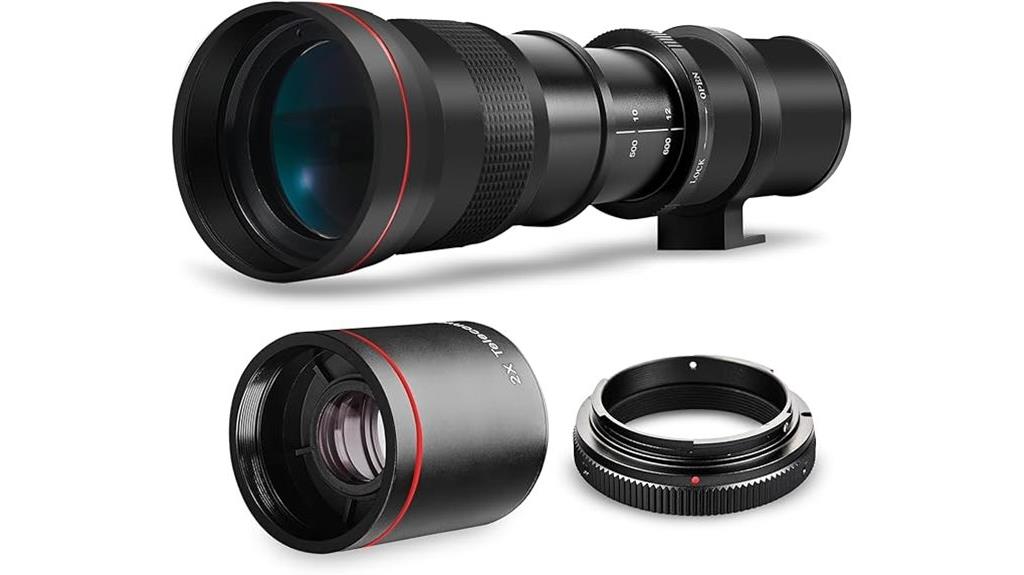
If you’re looking to capture distant subjects with remarkable reach, the High-Power 420-1600mm f/8.3 Telephoto Zoom Lens is an excellent choice for dedicated hobbyists and amateur photographers who don’t mind manual operation. Designed for Canon cameras, it offers a massive focal range and can extend to 800mm with a 2x teleconverter. While lacking autofocus and stabilization, it’s best used with a sturdy tripod. Despite its weight and some build concerns, many users find it rewarding for moon, wildlife, and terrestrial shots. It’s an affordable, long-range lens that demands patience but delivers impressive zoom capabilities.
Best For: hobbyists and amateur photographers seeking an affordable, long-range telephoto lens for wildlife, moon, and terrestrial photography who are comfortable with manual focus and tripod use.
Pros:
- Offers an extensive zoom range from 420mm to 1600mm, extendable to 800mm with a 2x teleconverter.
- Compatible with a wide range of Canon DSLR cameras, including Rebel, EOS, and SL series.
- Provides impressive long-distance imaging capabilities at a budget-friendly price point.
Cons:
- Lacks autofocus and image stabilization, requiring steady tripod support and manual operation.
- Heavier and longer than typical lenses, which may be cumbersome to handle and transport.
- Some users report hardware issues such as broken tripod mounts and cracked components, indicating variable build quality.
Canon EF 75-300mm Telephoto Zoom Lens for Canon SLR Cameras
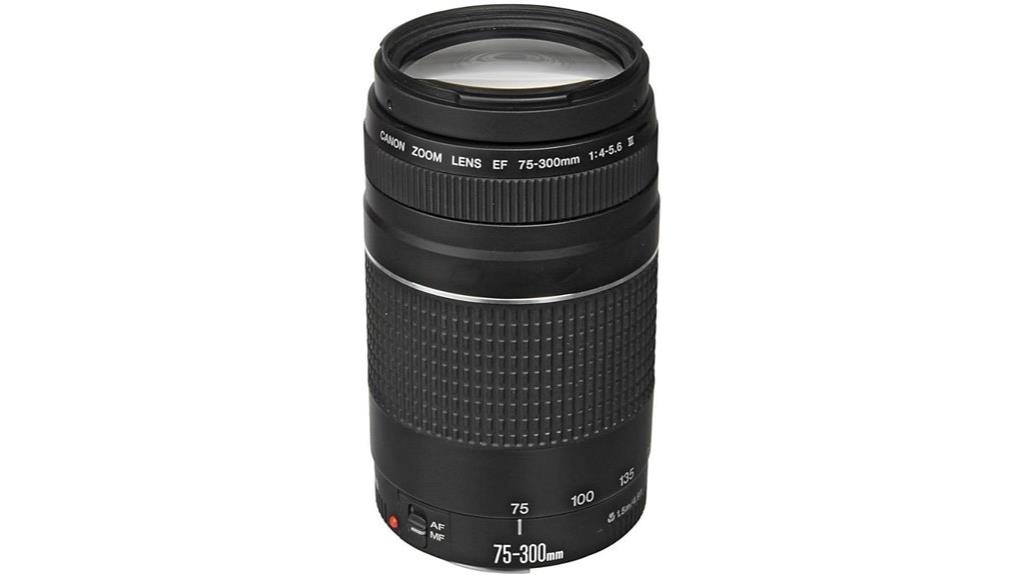
For hobbyists and casual photographers seeking an affordable yet reliable telephoto lens, the Canon EF 75-300mm f/4-5.6 III offers an excellent balance of performance and value. It’s lightweight, compact, and easy to handle, making it perfect for outdoor sports, wildlife, or travel photography. The lens features optical image stabilization and a smooth zoom mechanism, ensuring sharp images and comfortable operation. Autofocus is quick and quiet thanks to micro USM technology, and the durable metal mount adds to its reliability. Overall, it’s a versatile choice for enthusiasts wanting decent reach without breaking the bank, delivering solid image quality on Canon SLR cameras.
Best For: hobbyists and casual photographers seeking an affordable, lightweight telephoto lens for outdoor sports, wildlife, or travel photography.
Pros:
- Compact, lightweight design for easy handling and portability
- Optical image stabilization and smooth zoom for sharp images and comfortable use
- Durable metal mount and reliable autofocus with micro USM technology
Cons:
- Autofocus can be slow in certain conditions
- Aperture range of f/4-5.6 may limit low-light performance
- Being a renewed product, it may have some cosmetic imperfections despite good functionality
High-Power 500mm/1000mm f/8 Manual Telephoto Lens for Nikon Cameras
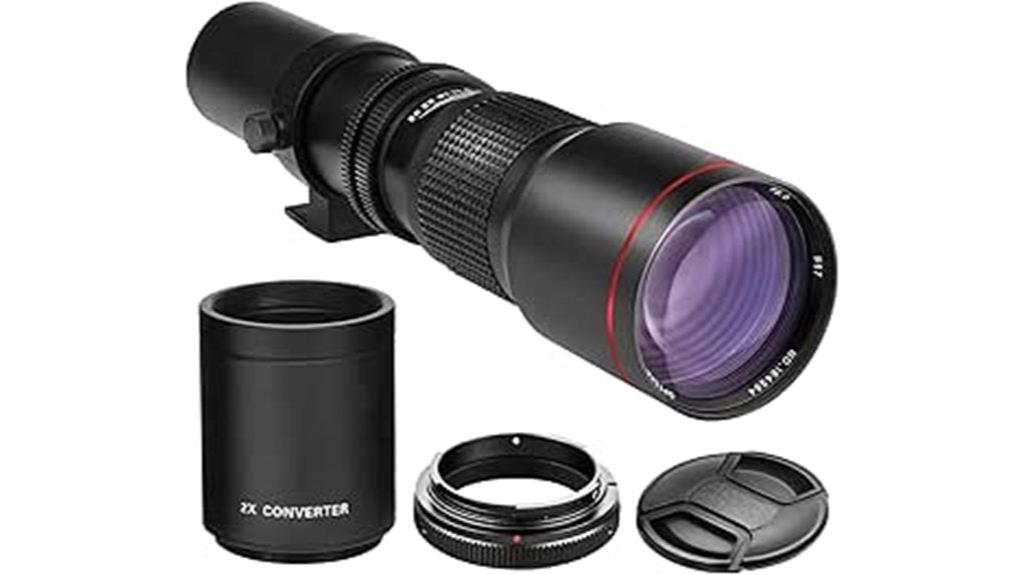
The High-Power 500mm/1000mm f/8 Manual Telephoto Lens is an excellent choice for Nikon users seeking affordable, long-range photography options. It’s compatible with a wide range of Nikon DSLR models, offering sharp, clear images thanks to its high-quality optical glass and multi-coatings. The lens provides 500mm of magnification and can be doubled to 1000mm with a 2X teleconverter, perfect for wildlife or astrophotography. Its rugged build and manual focus give you precise control, making it suitable for outdoor use. While some users report focus challenges and build concerns, many appreciate its affordability and versatility for capturing distant subjects.
Best For: amateur and beginner photographers using Nikon DSLR cameras who want an affordable, long-range telephoto lens for wildlife, landscape, or astrophotography.
Pros:
- Compatible with a wide range of Nikon DSLR models for versatile use
- Provides high magnification with an option to double to 1000mm with a 2X teleconverter
- Durable construction suitable for outdoor photography environments
Cons:
- Some users report difficulty with focusing and image sharpness in certain conditions
- Build quality concerns, including reports of broken components or incomplete delivery
- Manual focus and aperture control may be challenging for beginners unfamiliar with manual settings
Factors to Consider When Choosing Premium Professional DSLR Lenses

When selecting premium DSLR lenses, I focus on optical quality, autofocus speed, and how well the lens pairs with my camera. I also consider the aperture for creative control, as well as durability for tough conditions. These factors help me choose a lens that meets my specific photography needs and guarantees reliable performance.
Optical Quality Standards
Choosing a premium professional DSLR lens hinges on its optical quality, which guarantees sharp, clear images across the entire frame. High-resolution glass elements, advanced coatings, and tight manufacturing tolerances are essential to achieve this. Premium lenses use low dispersion and aspherical elements to minimize chromatic aberration, spherical aberration, and distortion, resulting in clearer images. Consistent sharpness from center to edges, even at wide apertures, ensures detail and contrast throughout the scene. Multi-coated glass surfaces reduce flare, ghosting, and reflections, especially in challenging lighting conditions, enhancing contrast and color fidelity. Rigorous testing against industry standards, such as resolving specific line pairs per millimeter, confirms the lens’s ability to deliver professional-grade optical performance. These standards are crucial for producing stunning, high-quality images.
Autofocus Performance Needs
Autofocus performance is vital for capturing sharp, in-focus images, especially when photographing fast-moving subjects like wildlife, sports, or events. The speed and accuracy of autofocus can vary greatly between lenses, with professional lenses generally providing faster, more reliable focus. Advanced autofocus systems often include features like Eye AF, subject tracking, and low-light sensitivity, which are invaluable in challenging conditions. The type of autofocus motor—such as USM, STM, VXD, or SWM—affects focusing speed, noise levels, and compatibility with video recording. Additionally, manual focus override and focus hold buttons are indispensable for quick adjustments when autofocus doesn’t lock properly. Prioritizing autofocus performance ensures you don’t miss critical moments and achieve consistently sharp results in demanding shooting scenarios.
Compatibility With Camera
Selecting a lens that’s compatible with your camera body is fundamental to guaranteeing smooth operation and ideal image quality. First, check that the lens mount matches your camera, whether it’s Canon EF, RF, EF-M, Nikon F, or Z. Make sure the lens suits your sensor size—full-frame or crop sensor—to optimize image quality and framing. Additionally, verify that the lens supports your camera’s autofocus system, including features like Eye AF or STM, for seamless focus performance. Confirm the electronic contacts are compatible, so EXIF data and autofocus functions communicate properly. Lastly, consider the lens’s firmware update options, as staying current guarantees ongoing compatibility with your camera’s latest firmware. Taking these factors into account helps prevent compatibility issues and ensures you get the best out of your gear.
Aperture and Bokeh Effect
A key factor in professional DSLR lenses is their aperture size, which directly impacts both light intake and the depth of field. A wider aperture, like f/1.4 or f/1.8, lets in more light, improving low-light performance and creating a shallow depth of field for stunning background blur, or bokeh. The shape and number of aperture blades influence the quality of this bokeh; more blades produce smoother, rounder highlights. Large maximum apertures help isolate subjects by blurring backgrounds, giving images a cinematic feel. The aperture setting also controls focus depth, emphasizing your subject against a softly blurred backdrop. Keep in mind, optical design enhances bokeh quality by reducing distortions and aberrations, ensuring your images look both professional and aesthetically pleasing.
Durability and Weather Resistance
When choosing a premium professional DSLR lens, durability and weather resistance are crucial factors that guarantee your equipment can withstand harsh environments. Look for lenses with extensive sealing and gasketed construction to prevent dust and moisture from entering. Opt for models made with rugged, high-quality materials like magnesium alloy or reinforced polycarbonate for added durability. Weather-resistant lenses often feature fluorine coatings on the front element to repel water, dirt, and fingerprints, maintaining clarity. Confirm the lens has a sealed mount and rubber gaskets around buttons and switches to protect against environmental stress. Additionally, check manufacturer specifications for IP ratings or weather sealing certifications, which indicate resistance to water ingress and dust. These features ensure your lens remains reliable in challenging shooting conditions.
Frequently Asked Questions
How Do Professional DSLR Lenses Improve Image Quality Over Kit Lenses?
Professional DSLR lenses improve image quality over kit lenses by offering superior optics, which reduce distortions and aberrations. They have wider apertures, allowing more light in for clearer, sharper images, especially in low light. The build quality is also better, ensuring durability and consistent performance. Overall, these lenses produce more vibrant colors, finer details, and a professional look that kit lenses simply can’t match.
What Are the Key Differences Between Prime and Zoom Premium Lenses?
Think of prime and zoom lenses as musical instruments—each with its unique sound. Prime lenses are like a flute, offering a single, pure note with exceptional clarity, perfect for capturing stunning details. Zoom lenses are like a versatile guitar, allowing you to play different chords without changing instruments, giving flexibility in framing. I find primes ideal for sharp images, while zooms excel in dynamic, on-the-go shooting.
How Does Lens Aperture Affect Image Sharpness and Background Blur?
Lens aperture considerably impacts both sharpness and background blur. A wider aperture (smaller f-number) lets in more light, creating a shallow depth of field that blurs backgrounds beautifully. This makes your subject stand out sharply. Conversely, a narrower aperture (larger f-number) increases depth of field, keeping more of the scene in focus but reducing background blur. I always choose the aperture based on the shot’s depth and sharpness needs.
Are There Specific Lenses Optimized for Low-Light or Night Photography?
Think of lenses as night-vision goggles for your camera. Yes, some lenses are specifically optimized for low-light or night photography. They usually have wider apertures like f/1.4 or f/2.8, which let in more light. Brands like Canon, Nikon, and Sigma offer stellar options such as the Canon 50mm f/1.2 or Nikon 58mm f/1.4. These lenses help you capture clear, sharp images even in the darkest conditions.
What Maintenance Is Required to Keep Premium Lenses Performing at Their Best?
To keep my premium lenses performing at their best, I regularly clean the glass with a soft, lint-free cloth and lens cleaning solution. I always store them in a protective case, avoiding extreme temperatures and humidity. I also check for dust or fungus inside the lens and have them professionally serviced if needed. Handling my lenses carefully and using protective filters helps maintain ideal image quality over time.
Conclusion
Choosing the right premium lens is like finding the perfect brush for a masterpiece; it transforms your vision into stunning reality. Remember, the best lens isn’t just about specs but how it helps you tell your story. So, take your time, consider your needs, and invest in a lens that will be your faithful partner in capturing life’s brightest moments. After all, the right tools turn ordinary scenes into extraordinary works of art.

